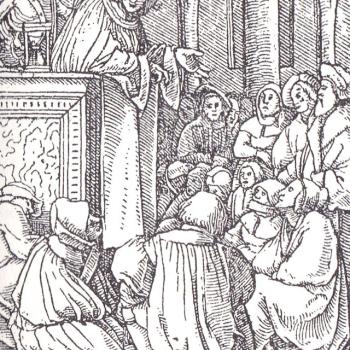Lectionary Reflections
Matthew 10:40-42
June 29, 2014
We all like to be rewarded for our efforts. Gold stars on our school papers as children. Praise from parents and teachers as we get older. Money as payment for our expenditure of our time and talents in our work. Perhaps being recognized publically with a plaque or round of applause for our community service. We all appreciate recognition and benefits from our actions.
Jesus is promising a reward for those who welcome prophets and righteous persons to the community, and for those who offer small kindnesses to the vulnerable in their midst. That reward is participation in the kingdom of God, which has both a present and a future component.
This text comes after Jesus' promise that those who lose their life for his sake will find it (Mt. 10:39). It's an answer to the question, "What is our reward for risking the loss of our lives as we know them for you?" Or, as Simon Peter so pragmatically puts it, "Look, we have left everything and followed you. What then will we have?"
His question and Jesus' answer show up three times in almost exactly the same wording in Matthew 19:27, Mark 10:28, and Luke 18:28. In Matthew 10:42, Jesus refers to "the reward of the righteous." It appears to be a bountiful compensation for the sacrifices we have made in this life, one that has both a worldly and eternal life component (Mt. 19:29; Mk. 10:29-30; Lk. 18:29-30).
What are those addressed by this text going to be rewarded for? Since Jesus sends his disciples to act on his behalf, those who receive them also receive Jesus (10:40a). And in receiving Jesus they also receive God, the one who sent him. Underlying this saying is the shaliach conception of ancient Jewish law, according to which a man's duly authorized messenger "is as the man himself." (Hare, Interpretation Commentary on Matthew, 118) The one sent out represents the one who sent him, so that to receive a disciple of Christ is to receive Christ and to receive Christ is to receive God. (Argyle, Cambridge Commentary on Matthew, 83-4)
There is much scholarly debate about the identity of the persons referred to in this brief passage: righteous ones, prophets, and little ones. In Matthew's gospel, the disciples themselves embody all three identities. Matthew emphasizes that disciples serving as Jesus' agents are his righteous ones and prophets, even greater than the prophets of old (Mt 5:11-12, 11:9, 13:17). For him, disciples were also little ones (10:42), the easily oppressed and powerless who depended solely on God (18:3-6, 10). (Albright and Mann, Anchor Bible Commentary on Matthew) The disciples are prophets (10:41a); they are the righteous (10:41b) who "let their light shine before men (5:16) as they minister to the towns and villages of Israel (10:11-14). And they are the little ones. They have nothing and might even be in need of a cup of cold water (10:42). (Daniel Patte, Matthew, 156)
Those who receive the disciples also receive the same benefits or reward they receive, the blessing of participation in the kingdom of God as outlined by Jesus by way of Matthew in the Beatitudes (Mt. 5:3-10). The Beatitudes have a future, but also a present reference. The poor in spirit, those who mourn, the meek, those who hunger and thirst for righteousness, the merciful, the pure in heart, the peacemakers, those who are persecuted for righteousness' sake—all participate in the present in the blessings of divine presence, comfort, wisdom, forgiveness, which are the realities of the reign of God now and forever.
Participation in the kingdom of God is the reward of the righteous person. It is not wholly extrinsic like the gold stars and the round of applause. The righteousness Jesus is talking about in Matthew carries with it an intrinsic reward, one that is an integral part of the action of welcome and kindness. Such righteous acts participate in and point us toward God. (Gingles, conversation about religious ethics)
I became intrigued with this notion of intrinsic reward for kind and positive deeds and began collecting a number of affirmations from a variety of historical and current figures.
"The most difficult thing is the decision to act, the rest is merely tenacity. The fears are paper tigers. You can do anything you decide to do. You can act to change and control your life; and the procedure, the process is its own reward."—Amelia Earhart (American aviation pioneer and author and the first female aviator to fly solo across the Atlantic Ocean, for which she received the U.S. Distinguished Flying Cross, 1897-1937)
"If people are good only because they fear punishment, and hope for reward, then we are a sorry lot indeed."—Albert Einstein (German-born theoretical physicist who developed the general theory of relativity, and one of the two pillars of modern physics, best known for his mass–energy equivalence formula E = mc², 1879-1955)





